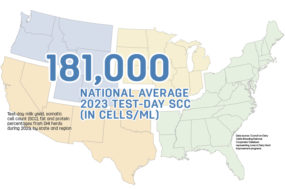Environmentalists are making a new push for stricter regulations on large livestock operations in Indiana, even as the number of such farms with thousands of animals continues to decline. The Indiana Department of Environmental Management recorded a decrease of 57 permitted farms in the past year to 1,994 – part of a decline of nearly 10 percent over the past four years, The Journal Gazette of Fort Wayne reported (http://bit.ly/qx134Y).
The farms, known as concentrated animal feeding operations, had boomed in the state as some farmers embraced them as a labor-efficient method that protects animals from disease and outside predators by raising them – often hogs or dairy cattle – in environmentally controlled housing.Although the agency learned of an increase in those operations filing for bankruptcy last year, IDEM said it didn't know how many closed for financial reasons and that some of the farms might have undergone consolidations.
Christopher Hurt, an agricultural economist at Purdue University, said estimates were that hog farmers lost $20 for every hog they produced in 2008 and 2009. For a farm with 10,000 hogs, for example, that could add up to about a $200,000 loss.
The economic downturn depressed prices for the animals at a time of record-high feed prices, Hurt said. While the outlook for hog producers has improved, he doesn't expect many immediate expansions.
The state environmental agency and the Indiana State Chemist, an office that oversees agricultural laws involving seeds, fertilizers, animal feeds and pesticides, are currently reviewing manure-management rules that cover the large farms.
Tim Maloney, senior policy director at the Hoosier Environmental Council, said counties have responded to the arrival of the livestock operations by adopting tougher zoning regulations for them.
Pollution troubles from the farms most frequently come from leaks or overflows of massive manure-storage tanks or "lagoons," or by improper application of manure to fields as fertilizer.
Maloney said rules have been lacking on livestock farmers who apply the manure from their own livestock to their fields and by those who buy manure from large farms to use as fertilizer.
"We want to be sure they're reasonable, but they're still as strong as they can be to accomplish their goals," Maloney said. "If these types of facilities are going to operate in Indiana, it's important that they be good citizens." PD
—AP newswire report; information from The Journal Gazette, http://www.journalgazette.net



